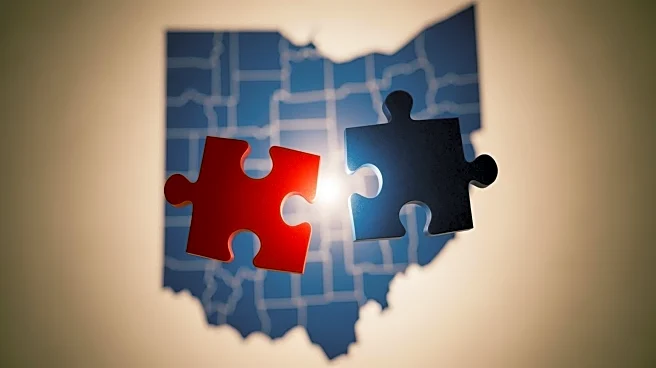What's Happening?
The Ohio Redistricting Commission is set to meet on Tuesday, October 21, to discuss the congressional map redraw, as ordered by Governor Mike DeWine. The commission includes Republican executive officeholders
such as DeWine, Secretary of State Frank LaRose, and Auditor Keith Faber, along with legislative members from both parties. A key issue is whether the commission can agree on a map that satisfies the two Democrats on the panel, which is necessary for the process to advance to the General Assembly. House Speaker Matt Huffman has indicated that formal actions will be taken during the meeting, but he has not committed to presenting a map. The commission's previous attempt to produce a map in September ended without agreement, highlighting the ongoing partisan challenges in the redistricting process.
Why It's Important?
The outcome of Ohio's redistricting process is crucial as it will determine the political landscape of the state for the next several years. The current congressional map favors Republicans with a 10-5 split, and Democrats are pushing for a more balanced map. The inability to reach a bipartisan agreement could lead to Republicans passing a map without Democratic support, which would only be valid for six years. This situation reflects broader national trends where partisan redistricting efforts are reshaping electoral districts, potentially impacting representation and political power. The stakes are high, as the final map will influence election outcomes and policy decisions in Ohio.
What's Next?
If the commission fails to reach a bipartisan agreement by the end of the month, Republican lawmakers have the option to pass a map without Democratic votes. This map would be temporary, lasting only six years, but it could significantly alter the political balance in Ohio. The commission's meeting on Tuesday will be a critical step in determining whether a compromise can be reached. Stakeholders, including political leaders and civil society groups, will be closely monitoring the process, as the decisions made could have long-term implications for Ohio's political representation.
Beyond the Headlines
The redistricting process in Ohio highlights the ethical and legal challenges associated with gerrymandering. The struggle to create fair and representative electoral maps raises questions about the integrity of the democratic process and the influence of partisan interests. As states across the country grapple with similar issues, the outcomes in Ohio could set precedents for future redistricting efforts, potentially prompting legal challenges and calls for reform.









